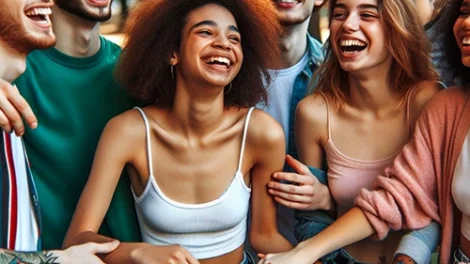In a culture where men are characterized as having overwhelming physical impulses, it’s necessary to ask if girls also have physical desires like guys do. Society has always stereotyped women as more reticent about sexuality and passion. Is this true or simply another gender bias myth? Join us as we explore female sexuality and whether girls have physical wants like boys.

Exploring the notion of female physical desires
For millennia, people have disputed whether ladies have bodily wants like guys. Society sees men as more sexually oriented, yet women can still have great physical cravings. Research reveals that women have complex and powerful sexual needs that are often disregarded or misunderstood.
Table of Contents
Cultural training and societal norms may cause misunderstanding. Girls are educated early on to be demure, modest, and sexually apathetic. When they admit their physical wants, these firmly held ideas might cause shame or guilt. We must respect human uniqueness and acknowledge that girls have many sexual needs and wants.
Understanding female pleasure is also necessary to comprehend female physical desires. Women’s desire may be altered by emotional connection, cerebral stimulation, or environmental context, unlike men’s simplified sexual response cycle. Thus, recognizing these subtleties helps us transcend stereotypes and understand female physical desires. Our goal is to empower people to embrace their unique experiences and promote healthy sexuality discourse for all genders.
Understanding the complexity of human sexuality
The complexity of human sexuality amazes, challenges, and discovers. The stereotype that men are more physically driven than women is far from true. Contrary to popular belief, ladies have intense physical cravings like boys. Desire exists, but society has conditioned people to express and experience it differently.
Sexually reserved women are typically expected in society. This may repress feminine desires and undervalue them. Recent studies have proven that women have naturally equivalent desire levels to males; only the cultural taboo surrounding female sexuality hides this.
Understanding these subtleties helps us remove gendered sexual hunger clichés. Conversations about consent, empowerment, and individual sexual experiences are encouraged. We create an inclusive environment where all people feel seen, heard, and acknowledged in their unique sexual journeys by questioning traditional conceptions about male and female physical desire.
Debunking stereotypes and societal expectations
Break the misconception that women don’t want tangible things. Society has long assumed that men have insatiable physical intimacy needs, while women are more restrained and docile. However, this is completely false. It’s important to dispel the myth that women can’t have great physical wants to promote healthy female sexuality.
This prejudice may stem from early social expectations of women. Girls are trained to hide their emotions and value modesty over self-expression from childhood. This established belief makes people think women lack sexual desire or enjoyment. Denying female sexuality harms all women and reinforces detrimental gender norms that limit expression and exploration.
Women have many bodily wants like men. Society should accept these disparities without judgment or prejudice, allowing everyone—regardless of gender—to pursue their own objectives without societal pressures. Challenge female sexuality stereotypes and acknowledge the diversity of human desire to build a more inclusive world where everyone may express their individuality without judgment or guilt.
The role of biology and hormonal fluctuations
Men are thought to have stronger physical needs than women. It ignores biology and hormonal changes that shape female desire. While testosterone is linked to sexual desire and is higher in males, women also experience variations in estrogen and progesterone during their menstrual cycle.
Women’s libido rises two weeks before menstruation during ovulation. Hormonal surges can increase arousal and physical intimacy. However, hormonal changes during menstruation and premenstruation might reduce sex drive or pain. Understanding these biological elements dispels stereotypes about women lacking physical wants and shows the complicated relationship between biology and sexuality.
Not everyone’s bodily desire experiences are the same, regardless of gender. Cultural conventions and personal preferences also influence attitudes toward sexuality attitudes. Expanding our understanding of biology’s influence on desire and embracing its complexity within each person can help us embrace a more inclusive sexuality that honors various experiences rather than outdated stereotypes.
Social and cultural influences on sexual desires
For years, people have debated whether girls have the same physical wants as guys. Yes, definitely! However, culture and society often influence how these aspirations are expressed and acknowledged. Many societies have a double standard for discussing female sexuality. Women are judged for pursuing their ambitions, whereas men are encouraged to do so.
Social standards also shape women’s sexual appetites. Female desire is generally portrayed as meek and subservient, driven by sentiment rather than pleasure. This restrictive definition ignores female variation and misrepresents women’s sexual desire.
Additionally, the media shapes our sexual urge perceptions. Popular culture presents males as more sexually driven than women, reinforcing the notion that male desire is universal and downplaying female desire.
In conclusion, culture and society strongly impact sexual urges and expression.
The importance of open communication and consent
It is a frequent misperception that only men have physical wants and that girls are passive in intimate relationships. It’s important to remember that girls have bodily urges and deserve body autonomy too. Girls need open communication and consent to express their wants without shame or condemnation.
When discussing female desire, society often has a double standard. Guys are praised for openly expressing their sexual wants, whereas girls are chastised or labeled promiscuous. This societal bias makes it hard for girls to talk about desire, encouraging guilt and secrecy. We can normalize and empower consent conversations by acknowledging that all genders have physical desires.
Open communication builds trust and ensures comfort during intimate encounters. Never assume consent; seek it through unambiguous verbal or non-verbal indicators from both parties. Open conversation about our needs and boundaries creates respectful relationships and safer settings where everyone feels heard and respected.
Finally, acknowledging that girls have bodily desires undermines female sexuality norms and promotes consent discussions. By removing stigmas surrounding female desire, we foster healthier, mutually respectful relationships where everyone can express herself without fear.
Recognizing that girls also have physical desires
Do girls have physical wants like guys? For years, many have assumed that only men had strong physical impulses. Females also have sexual and emotional desires, contrary to popular thought. Due to established gender norms and assumptions that make women passive about physical pleasure, society overlooks this truth. It is important to remember that women’s desires are as complex as men’s.
Understanding that female desire includes sexual appetites as well as romantic and emotional relationships is vital. Women should feel free to explore their sensuality without guilt. It’s time to abandon the idea that men are more sexually driven than women—passion may spark in everyone. We empower women to express their physical wants by rethinking female sexuality.
To understand female sexuality, we must dispel another myth: physical desire goes beyond reproduction and partner needs. Girls seek pleasure and connection for personal reasons, not social norms. Reclaiming this story helps us understand the variety and distinctiveness of human desire and encourages frank discussions about sex without propagating damaging gender stereotypes.
Conclusion
In conclusion, the subject of whether ladies have physical urges like guys deserves sensitivity and respect. When discussing sexuality, stereotypes must be challenged. The concept that males express their physical urges more than women hide their emotions understates human desire’s complexity.
First and foremost, physical urges are gender-neutral. Humans have many physical desires and attractions, regardless of gender. These desires are innate to our biology and psychology. To say otherwise would simplify human sexuality.
Traditional gender roles and societal expectations perpetuate the idea that men communicate their wishes more than women. Stereotypes have evolved and can limit and harm. Physical desire expression and experience vary widely, regardless of gender.
Moving beyond these preconceptions and having honest conversations about physical desire is vital. Recognizing that girls and boys have physical wants promotes good attitudes and relationships. Understanding and accepting our shared human experiences requires communication, trust, and respect.
Bottom line: physical desire transcends gender. It’s not about guys being more expressive than women, but about accepting that everyone expresses their desires differently. To create a more inclusive and educated society, we must promote awareness and respect for physical desire disparities. We need to eradicate stereotypes and encourage people to be themselves without shame.








Wonderful web site Lots of useful info here Im sending it to a few friends ans additionally sharing in delicious And obviously thanks to your effort
Wow amazing blog layout How long have you been blogging for you made blogging look easy The overall look of your web site is magnificent as well as the content
I am not sure where youre getting your info but good topic I needs to spend some time learning much more or understanding more Thanks for magnificent info I was looking for this information for my mission